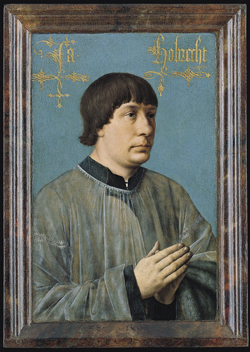
Anonymous (Memling?)
Jacob Obrecht
with permission of
Kimbell Art Museum, Fort Worth, Texas
Art Resource, NY
Jacob Obrecht was a South Netherlandish composer known mainly for his substantial output of Mass(from Latin missa, “dismissed”) (1) Main service of Roman Catholic worship. (2) Musical setting of the texts of the Ordinary of the Mass, usually the Kyrie, Gloria, Credo, Sanctus, and Agnus Dei OrdinaryThe category of plainsong for the Mass whose texts do not vary and are sung almost every day of the liturgical year: Kyrie, Gloria, Credo, Sanctus, and Agnus Dei settings in the late 15th century, as well as for his motets and songs. Like his close contemporary Josquin des Prez, Obrecht was born and trained in the North, and led a peripatetic career involving positions and patrons both north and south of the Alps. Even as a young man in his twenties his talent and influence were celebrated: in the early 1480s the leading music theorist of the time, Johannes Tinctoris, ranked Obrecht among the masters “whose compositions, distributed throughout the whole world, fill God’s churches, the palaces of kings, and the houses of private individuals, with the utmost sweetness.”
Born in Ghent to the trumpeter Willem Obrecht and his first wife Lijsbette Gheeraerts, Jacob may have been preparing in his early years to follow his father’s work, but at some point shifted directions and entered the priesthood. After four years as the choirmaster at the Sint Gertrudiskerk in Bergen op Zoom, he took a similar position at Cambrai Cathedral, but soon left in favor of the succentorship at the church of Sint-Donaas in Bruges (1485). Obrecht composed the Missa de Sancto Martino and the Missa de Sancto Donatiano in 1486 and 1487. Soon after composing the latter work, he accepted the invitation of his admirer Duke Ercole d’Este to visit Ferrara, returning to Bruges after ten months. Sometime after the death of Willem Obrecht in November 1488, Jacob composed the motet Mille quingentis with the Introit from the Requiem Mass and a non-liturgical text about his father’s soul being carried to heaven.
The sixteen years following his time in Ferrara were spent in employment at Bruges, Bergen op Zoom, Antwerp, Innsbruck, and other unknown locations. In 1504 he was finally granted the coveted position of maestro di cappella at Ferrara, but the Duke’s death in 1505 left him unemployed until his death of the plague in June or July that year.
Like many successful men of his time, Obrecht commissioned a portrait of himself, shown here. It is dated 1496 and gives the sitter’s age as 38. The skillful treatment of the face and clothing has led art historians to suspect the hand of Bruges artist Hans MemlingProbably born in the German town of Seligenstadt, the man sometimes identified as the painter of Obrecht’s portrait spent most of his life in Bruges, at the same time as the Master of the St. Lucy Legend…, who died in 1494; the cruder handling of the hands suggest that another artist may have completed the work. We see in this extraordinarily realistic portrait a relaxed, healthy man of considerable dignity, whose strong nose and chin convey the impression of a strong-willed person who may have found it difficult to find a satisfactory employment situation.
And indeed, compared to other composers of his skill and stature in the late 15th century, Obrecht’s career never truly blossomed. Records of clashes with his superiors at the Cambrai Cathedral and at the Sint-Donaaskerk in Bruges suggest some financial dishonesty and professional laxity. Perhaps the quality of his voice, particularly later in his life, could also have been an obstacle in reaching the level of success enjoyed by other composers of the period, such as OckeghemJohannes Ockeghem, a native of Hainaut, earned considerable prominence due to his employment at the French royal court… and Josquin. Nonetheless, his substantial compositional legacy, especially the Mass music, was much admired in the decades after his death, especially in Germany, where the theorist Heinrich Glarean declared in 1542 that “all the works this man has left have a certain wonderful majesty and an innate quality of moderation.” As modern scholarship and performance continue to bring Obrecht and his music out of the shadows, our understanding and appreciation of his contribution to the history of music will surely deepen and grow.
Select Bibliography:
Wegman, Rob C. Born for the Muses: The Life and Masses of Jacob Obrecht. New York: Oxford University Press, 1994.
Wegman, Rob C. 2001 “Obrecht [Hobrecht], Jacob.” Grove Music Online. 7 Aug. 2018. www.grovemusiconline.com
Bloxam, M. Jennifer. “The Late Medieval Composer as Cleric: Browsing Chant Manuscripts with Obrecht.” In Exploring Christian Song, edited by M. Jennifer Bloxam and Andrew Shenton, 29-52. Lanham, MD: Lexington Books, 2017.
